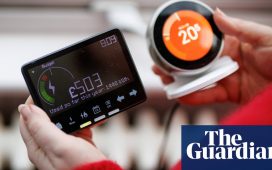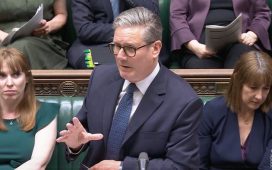The UK energy regulator has lowered the energy price cap by almost £1,000 for a typical home, but consumers will still end up with higher bills from April as the government reduces subsidies to households.
The price cap, which normally governs the amount paid for gas and electricity bills for typical usage, will fall to £3,280 from April having previously stood at £4,279 for the January to March period, Ofgem announced on Monday.
The drop partially reflects the significant decline in wholesale gas and electricity prices in recent months, with a further fall in the cap expected later in the year as lower costs to utilities start to feed through to bills.
The regulatory change will provide no relief for households, however, as the government is set to sharply reduce the amount of support it has provided.
Its energy price guarantee (EPG), which was put in place last October to limit typical bills to £2,500 over the winter months when energy use is highest, is set to rise to £3,000 from April. An extra £400 direct subsidy paid in six monthly instalments since October will also end.
Ofgem’s price cap determines the amount of subsidy the government has to provide above the level of its guarantee. Energy analysts are forecasting that from June the cap will fall below the level of the government’s price guarantee, at which point households with average usage will switch to paying that amount.
“Although wholesale prices have fallen, the price cap has not yet fallen below the planned level of the energy price guarantee. This means, that on current policy, bills will rise again in April,” said Ofgem chief executive Jonathan Brearley.
“However, today’s announcement reflects the fundamental shift in the cost of wholesale energy for the first time since the gas crisis began, and while it won’t make an immediate difference to consumers, it’s a sign that some of the immense pressure we’ve seen in the energy markets over the past 18 months may be starting to ease.”
Poverty campaigners have called on Jeremy Hunt, the UK chancellor, to keep the guarantee at £2,500 until the summer, pointing out that the cost of government’s energy support package has come in lower than forecast as wholesale prices have fallen.
Cornwall Insight, a consultancy, estimated the cost to the taxpayer of extending the £2,500 price guarantee to the end of June at about £2.5bn. It put the total cost of the scheme at £26.8bn if the government cut support as planned, rising to £29.4bn if the guarantee remained at £2,500.
But the Treasury has so far shown no sign of reversing course as it does not want to expose itself to the possibility that wholesale prices start to rise again.
Citizens Advice warned that the loss of government support would result in the number of households struggling to pay their bills doubling to one in five from the end of next month.
“Without further support from the government, this April will spell catastrophe for millions of households,” said Citizens Advice chief executive Clare Moriarty.
“The government must keep the EPG at its current level of £2,500. Recent drops in wholesale prices mean they have the headroom to do this. The alternative is millions more people unable to keep their house warm and keep the lights on,” she added.
Consumer champion Martin Lewis, who has also called for the price guarantee to remain at £2,500, said that “reading the runes” he believed the government could still reverse course.
“It seems to be an act of national mental health harm to send millions, almost everybody, a letter saying your energy bills are going to go up 20 per cent again when they’ve already more than doubled, just for the sake of three months,” Lewis told ITV’s Good Morning Britain. Lewis’s campaign is backed by Energy UK, the industry trade body, as well as dozens of charities.
Cornwall predicted Ofgem’s price cap would fall to about £2,100 in the last six months of this year, though forecasts further out are more volatile and could change depending on the direction of wholesale prices. Prior to the energy crisis the price cap usually hovered around £1,200.
The price cap does not limit how much consumers can pay if they use more than the typical amount of energy, so larger households generally pay more.










